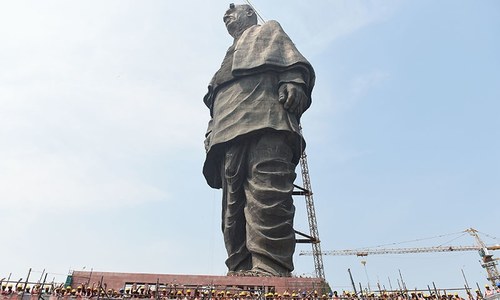NEW DELHI: From getting rid of some Muslim names of places to promising a “grand” statue of the Hindu god Ram, Indian Prime Minister Narendra Modi’s ruling party is making passionate appeals to its hard-core Hindu nationalist base in the most politically important state ahead of a national election next year.
A near clean-sweep in Uttar Pradesh, the northern state of 220 million people that sends the highest number of lawmakers to the lower house of parliament, helped Modi’s Bharatiya Janata Party (BJP) win its biggest mandate in three decades in 2014.
Political strategists say keeping its mainly Hindu base intact in Uttar Pradesh and elsewhere would be crucial to repeat such a performance, but there are also concerns that the BJP has been turning up the heat on divisive religious issues.
Yogi Adityanath, a robe-wearing Hindu priest who is the BJP chief minister of Uttar Pradesh, on Tuesday changed the name of Faizabad district to Ayodhya, the place where Hindus believe Lord Ram was born thousands of years ago. Before the change, Ayodhya was the name of a town in Faizabad.
Last month, he changed the name of Allahabad, where three rivers considered holy by Hindus meet, to the Hindu name Prayagraj.
Both Faizabad and Allahabad were Islamic names given to places hundreds of years ago by India’s then Muslim rulers.
“Ayodhya is our honour, prestige and pride,” Adityanath said at an event in the town, declaring the name change amid loud cheers from the audience.
“Ayodhya is identified with Lord Ram.”
He said the state would decide on a location for a statue of Ram that could become an Ayodhya landmark. He also promised to open an airport in the district that would be named after Ram.
Many leaders of the BJP and the Rashtriya Swayamsevak Sangh (RSS), the Hindu-first group from which the BJP was born, are demanding the government issue an executive order that would bypass the Supreme Court so that they can build a Ram temple at a highly controversial religious site in Ayodhya. The destruction of a mosque on that site by a frenzied Hindu mob in 1992 sparked deadly riots across the country.
At the moment the site is under court control. There are fears that communal tensions between the majority Hindu population and Muslims, the biggest minority group in India with more than 170 million people, could flare again if the status quo is disturbed.
The moves aren’t limited to Uttar Pradesh. In the western state of Gujarat, the BJP government there is also considering changing the name of the state’s commercial centre, Ahmedabad, a name given to it by a former Muslim ruler.
And only last week, Gujarat unveiled the world’s tallest statue, a $400 million effigy of independence hero Vallabhbhai Patel that is nearly twice the height of New York’s Statue of Liberty as part of a BJP campaign to re-brand what it terms “forgotten” leaders.—Reuters
Published in Dawn, November 9th, 2018














































